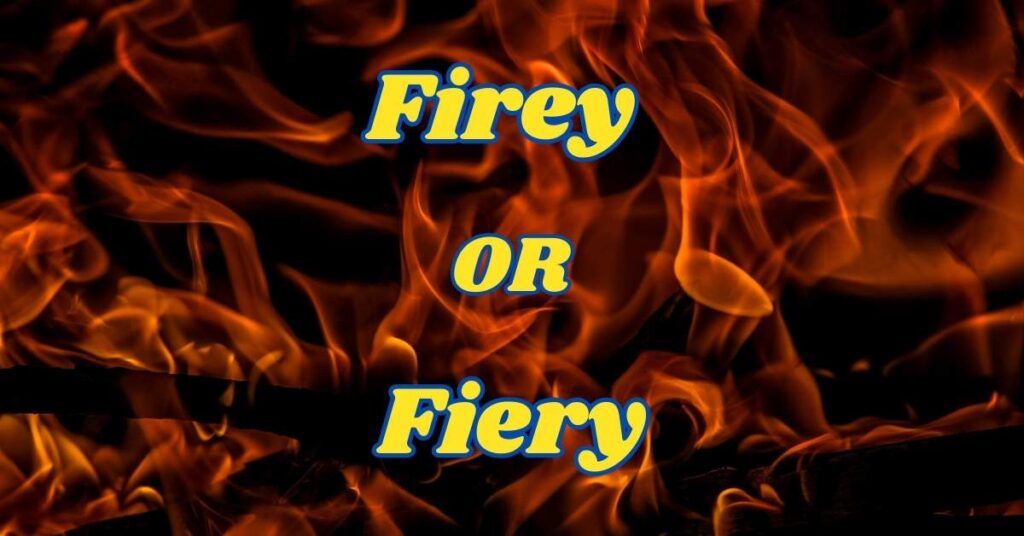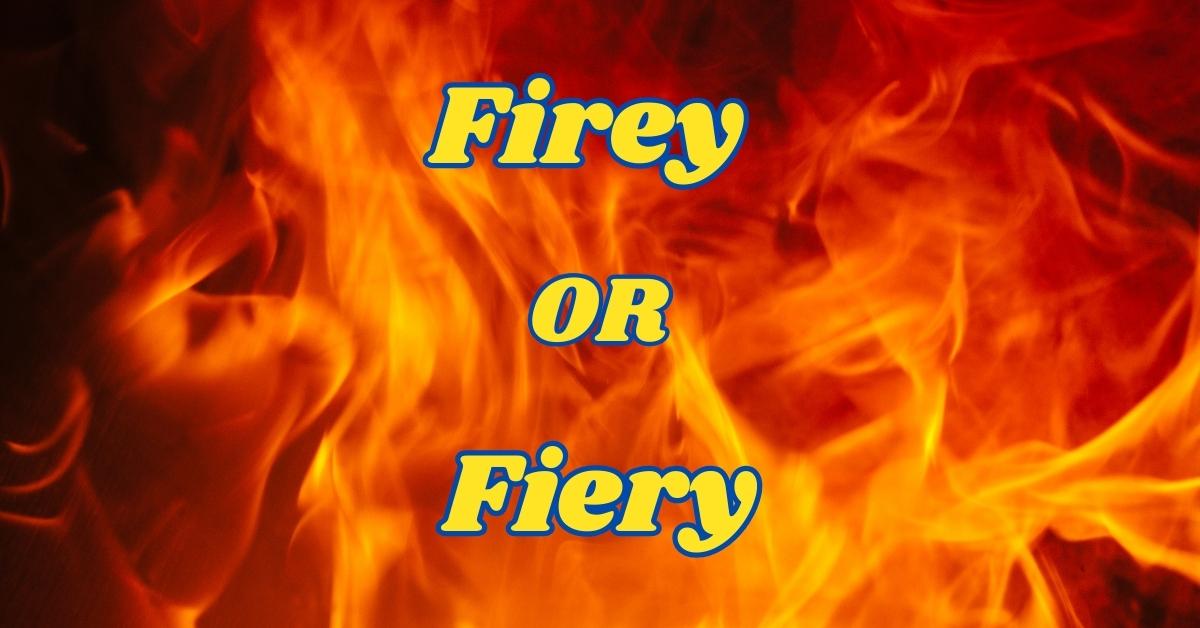Firey or Fiery, which one is correct? This common question often puzzles writers and speakers alike. The confusion arises from the similarity in pronunciation, but only one spelling holds up in standard English.
Understanding the difference between these two terms is essential for effective communication. Fiery describes something that relates to fire or embodies intense passion, while firey lacks legitimacy in modern usage.
In this article, we will delve into the meanings, origins, and proper usage of firey and fiery. By the end, you’ll confidently choose the right term and enhance your language skills, ensuring your writing is both accurate and expressive.
Quick Summary
Fiery is the correct spelling. It describes something that relates to fire or has a passionate nature. On the other hand, firey is considered incorrect in modern English usage. Understanding this distinction can help you communicate more effectively and avoid common spelling errors.
Understanding Firey or Fiery

Firey and fiery often confuse people because they sound alike. However, only fiery is recognized as a proper word in English dictionaries. The term fiery can describe anything that resembles fire, such as colors or emotions.
For example, you might say someone has a fiery personality if they are passionate and intense. In contrast, firey does not hold any legitimate meaning in the English language today.
Understanding Adjectives
To fully grasp the difference between these two words, it helps to understand what adjectives are. Adjectives are descriptive words that modify nouns by providing more information about them.
For instance, in the phrase “the fiery sunset,” the adjective fiery describes the type of sunset one that is bright and vibrant like flames. Adjectives can be categorized into various types, including positive adjectives that convey good qualities and comparative adjectives used for comparison.
Is “Firey” a Real Word?
While you might come across the spelling firey, it is not considered a real word in formal English. Some people may use it informally or mistakenly think it is correct due to its phonetic similarity to other words. However, sticking with fiery words ensures you use the language correctly and effectively.
Origins of the Fiery
The word fiery emerged in the late 13th century, meaning “flaming” or “full of fire.” It derives from the Middle English word fier, which means “fire,” combined with the suffix -y. Various Middle English spellings existed, including firi and furi.
By the 1400s, it also described colors like blazing red. The term has roots in Old English, where adjectives like fyrbære (fire-bearing) and fyren (of fire) were used, reflecting its long-standing connection to both physical and emotional intensity.
Firey: Definition and Usage

Firey is often mistakenly used in place of the correct spelling, fiery. While some may think it conveys a similar meaning, firey lacks official recognition in modern English. It is important to understand that firey has no established definition or usage in standard language.
Therefore, relying on the correct term fiery ensures clear communication and avoids confusion in writing and speech.
Firey Definition
Firey is not recognized as a standard word, it does not have an official definition. It is often seen as a misspelling of fiery, which describes something related to fire or intense emotions. Using firey can lead to misunderstandings, so it’s best to avoid it altogether.
Firey Usage
The usage of firey is rare and generally incorrect in formal writing or speech. While some may use it informally, it fails to convey the intended meaning. For clarity, always use fiery instead, as in correcting “The firey sunset was breathtaking” to “The fiery sunset was breathtaking.”
Uses of Firey in a Context
- A person might describe a sunset as having a firey glow.
- Someone could refer to a character’s firey demeanor in a story.
- In literature, an author might depict a firey scene filled with passion.
- A chef may describe their dish as having a firey flavor.
- People often discuss their firey emotions during intense debates.
Fiery: Definition and Usage

Fiery is an adjective that describes something related to fire or resembling flames. It can also refer to intense emotions, such as passion or anger. This versatile word captures the essence of heat and fervor, making it useful in various contexts.
Whether describing a vibrant sunset, a passionate speech, or a spicy dish, fiery adds vivid imagery and emotional depth to language, enhancing communication and expression.
Fiery Definition
Fiery refers to anything that is like fire in appearance or nature. It can describe colors that are bright and intense, such as reds and oranges, or it can characterize a person’s temperament as passionate and spirited.
The word evokes strong imagery, making it a powerful choice for writers aiming to convey vivid scenes or emotions.
Fiery Usage
Fiery describes both physical attributes and emotional states. For instance, “She delivered a fiery performance that left the audience in awe,” emphasizes intensity.
Additionally, it can refer to spicy food, as in “The dish was so fiery that it made my eyes water,” showcasing its versatility.
Uses of Fiery in a Context
- The politician delivered a fiery speech that inspired many.
- Their fiery love story captivated readers around the world.
- The artist painted a fiery landscape that evoked strong emotions.
- The dish was so spicy that it left a fiery sensation on my tongue.
- She had a fiery spirit that shone through her every action.
Synonyms of Fiery
Here are synonyms for the word fiery, which can help expand your vocabulary:
- Passionate
- Intense
- Blazing
- Enthusiastic
- Zealous
- Fervent
- Ardent
- Incendiary
- Vehement
- Hot-headed
Side by Side Comparison
| Aspect | Firey | Fiery |
| Correctness | Incorrect | Correct |
| Usage | Rarely used | Commonly used |
| Meaning | Informal | Descriptive |
Everyday Usage Examples

Understanding how to use firey and fiery in everyday language can help clarify their meanings. While fiery is the correct term, people sometimes mistakenly use firey.
Here are examples to illustrate the proper usage of both words in different contexts, showcasing how they can convey vivid imagery and emotions.
Firey Example
An example of using firey might be: “The artist painted a firey sunset that captivated everyone at the gallery.” In this sentence, the word attempts to describe a vibrant scene but should ideally be replaced with fiery for accuracy.
Fiery Example
In contrast, a correct usage of fiery is: “Her fiery enthusiasm for the project inspired the entire team.” This sentence effectively demonstrates how fiery conveys passion and intensity, making it a powerful descriptor.
Examples of “Fiery” in Sentences
- The chef’s fiery salsa made everyone reach for water.
- His fiery passion for music drove him to practice daily.
- The movie’s fiery climax left audiences on the edge of their seats.
- She gave a fiery performance that moved everyone in attendance.
- Their team celebrated with fiery enthusiasm after winning the game.
Tips for Avoiding Spelling Errors

To avoid making mistakes when writing, consider these tips:
- Sound out words phonetically; this can help clarify tricky spellings.
- Use mnemonic devices to remember how to spell difficult words.
- Read frequently to familiarize yourself with correct forms.
- Practice writing regularly to reinforce your learning.
- Utilize spell-check tools effectively to catch errors before submitting your work.
Tips for Proofreading
Proofreading is essential for clear communication; here are helpful tips:
- Read your work aloud; this helps catch errors you might miss silently.
- Take breaks between writing and proofreading for fresh eyes on your work.
- Use grammar-check software as an additional resource for accuracy.
- Focus on one type of error at a time during proofreading (e.g., spelling).
- Ask someone else to review your work; another perspective can reveal mistakes.
More Article: What is the Plural of Chief? Chiefs or Chieves?
Conclusion
The distinction between Firey or Fiery is crucial for clear and effective communication. While fiery is the correct spelling, conveying passion and intensity, firey is not recognized in standard English. By using the term fiery appropriately, you enhance your writing and avoid common mistakes.
Remember to apply the tips shared in this article to ensure accurate spelling and usage. Embracing the correct form will not only improve your language skills but also enrich your expressions, making your communication more impactful.
FAQs: Firey or Fiery
Why is it fiery instead of firey?
Fiery is the correct spelling, derived from Middle English, while firey is a common misspelling that lacks official recognition.
Does fiery mean hot?
Yes, fiery can describe something that is hot, especially in reference to temperature or intense emotions.
Is fiery a word?
Yes, fiery is an established word in English, meaning related to fire or characterized by intense passion.
What does fiery mean in slang?
In slang, fiery often describes someone who is passionate, enthusiastic, or emotionally intense in their behavior or personality.
Related Post: Usage or Useage: What’s the Difference?

